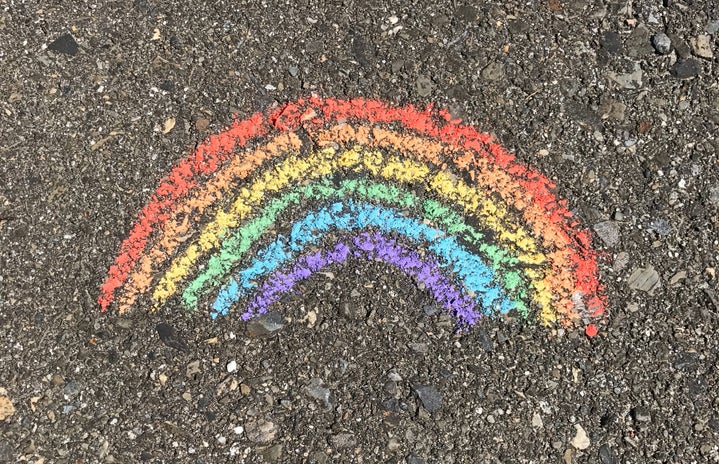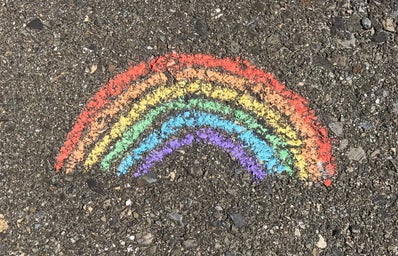Reneé Rapp has been making headlines everywhere she goes this year, and her career is only just taking off. Whether you first recognize her from her acting roles on “The Sex Lives of College Girls” or the new “Mean Girls” musical or are more familiar with her singing career, which blew up in August with the release of her debut album “Snow Angel”, I guarantee you’ve heard her name before. Not only does Rapp have show-stopping vocal skills and a powerful stage presence, she is also the perfect role model for her queer, Gen Z fans who admire her confidence and transparency regarding her sexuality. Although celebrities obviously don’t owe their fans any explicit information regarding their sexual identities, Rapp’s continual trademark blunt honesty about it is so refreshing in a world where LGBTQ+ people are constantly being told to “stop making their identity their whole personality.”
In a 2022 Vogue interview, Rapp identified herself as bisexual and stuck with that label up until her recent appearance on “Saturday Night Live” in late January where she confirmed to her fans that she now identifies as a lesbian. This change happened before she embarked on the European branch of her “Snow Hard Feelings” tour, so when she started up her concerts again in February, she began to poke fun at some of the song lyrics she wrote when she identified as bisexual to reflect her new identity, gaining a lot of traction on the internet with these alterations.
While at first glance Rapp ad libbing “No he’s not” after the “Pretty Girls” lyric “Yeah, your boyfriend’s cute”, seems like a silly joke between her and her fans as a way to gently tease herself for writing lyrics about men then coming out as a lesbian, these additions have actually done so much more to uplift and inspire her queer fanbase than one might think. Sexuality exists and will always exist on a spectrum, and while nobody should ever feel pressured to come out under one label and stick to it for the rest of their lives, that pressure exists and sometimes people are still scared to reveal they now prefer a new label for fear of how others will react.
Rapp’s updating of her sexual identity reminds her fans that it is completely okay to play around with different labels until something finally sticks and feels comfortable. Also, if a certain label used to fit but doesn’t anymore, that’s completely okay too, because we will always continue to learn more about ourselves with time and experience, so it is more unlikely that the label you came out with when you were 14 is going to stick forever than you might think. Rapp’s new identity also reminds people that it is never too late to settle on a new label for yourself as well. As a celebrity, her entire life is pretty much on display to everyone all the time. She literally has been quoted in Vogue magazine calling herself bisexual and many of her biggest hit songs include lyrics about being with men, but she didn’t let this scare her into standing by a label that is no longer correct just because that’s how the world once saw her.
This example shows her fans that if it’s not too late for her to grow out of her sexuality, then it isn’t too late for them either. Whether you follow in her footsteps exactly and are afraid to switch from bisexual to gay or lesbian, or even if you are having second thoughts about identifying as straight, you don’t sign a contract in permanent ink with the first sexual identity you associate with. The fluidity and impermanence of sexuality is a beautiful thing, you can wake up everyday and feel differently about your identity because nobody really cares nowadays, and you don’t owe anyone an explanation or a label set in stone.
Rapp is a pioneer in the realm of Gen Z celebrities for her unapologetic attitude about not only her sexuality but also her struggles with body image and mental health, and she deserves so much more credit for her willingness to be candid about her lows as well as her highs. Having her bluntness be written off by some as a “lack of media training” is just the public’s way of trying to force her to be more unattainable and less human. Her relatability is what’s going to give her longevity in the spotlight, people need these types of celebrities in order to have a role model and be reassured that even their favorite singer doesn’t have a perfect day everyday to help them feel more normal about their struggles.
I am forever grateful for society’s expanded acceptance of the fact that sexuality is a fluid expression of identity and everyone is entitled to change their minds as they learn more about themselves and who they want as a partner. The openness of certain celebrities today assists so greatly in creating an ever expanding safe space for queer people to switch around their labels and experiment with their sexuality as they please when they know they have a well-liked public figure in their corner who can empathize with what they’re going through. If Reneé Rapp can reconsider her previous label after having it printed in Vogue magazine and splattered all over her previously released music, then please feel free to follow in her example and don’t force yourself to stick with an uncomfortable label for fear of others judging your retraction. Your identity is valid no matter what!


